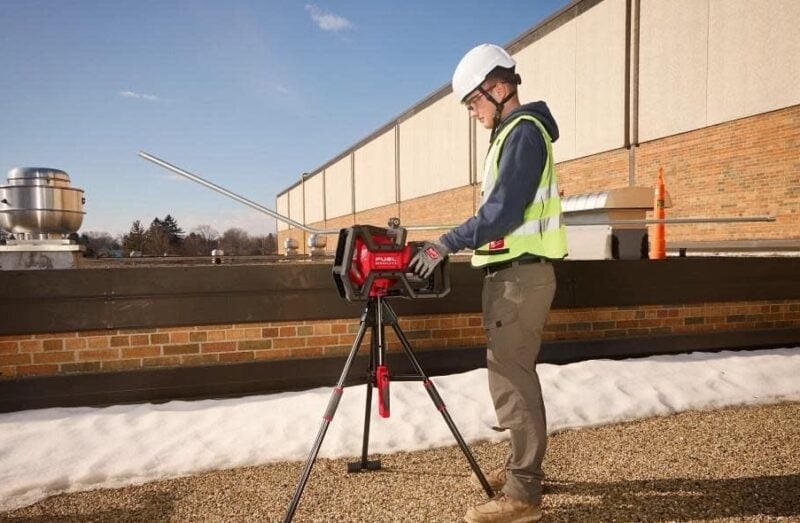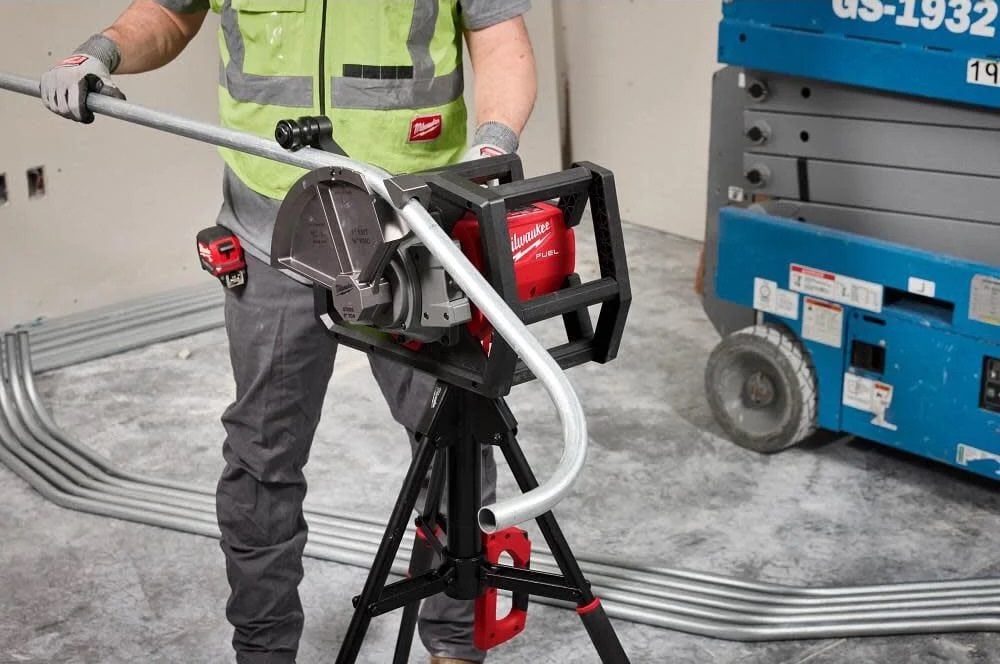Milwaukee Cordless Conduit Bender Takes the Pain Out of Bending
Bending conduit with a hand bender is a skill that many tradesmen develop with repeated practice. However, it requires a good amount of body strength, and it’s still common for angles to be off when bending by eye. The Milwaukee 5150 M18 Fuel Conduit Bender addresses these common pain points, leading to a more effective, simple, and accurate bending experience. Is it a good fit for your jobsite? I’m walking you through the big picture to help you decide.
Powering Installs with the Milwaukee M18 Fuel Conduit Bender

- Model: Milwaukee 5150-20
- Runtime: Up to 110 bends on 3/4-inch EMT conduit
- Brushless motor
- Auto-zero senses 0° on every bend
- Compatibility: 3/4-inch – 1-inch EMT; 1/2-inch – 3/4-inch RMC/IMC
- Weight: 41 lb
The Milwaukee M18 Fuel Conduit Bender is the first portable cordless conduit bender from a major power tool manufacturer. Milwaukee designed it specifically for commercial and industrial branch installations by professional electricians.
It handles EMT conduit ranging from 3/4-inch to 1-inch in diameter, as well as 1/2-inch to 3/4-inch intermediate and rigid metal conduit.
So, why invest in a cordless bending machine over a traditional hand-bending device? Well, for starters, the 5150 claims up to 2X faster bends. Using a 5.0Ah M18 battery (sold separately), the 5150 can complete up to 110 bends on 3/4-inch EMT conduit. We expect the runtime to decrease when working with IMC and RMC, though Milwaukee doesn’t provide estimates for those materials. Regardless, that’s a lot of bends for one battery.
It also claims to deliver more accurate bends, resulting in less material loss due to scrapped bends. Before starting a bend, the unit’s Auto-Zero function senses 0° to keep your conduit level throughout the bend and ensure accurate angles. From there, you can use the control panel to set your bend angle and material size.
Milwaukee also accounted for spring-back, which is when your conduit starts to bend back to its original shape. Milwaukee says the 5150 automatically compensates for spring back in every bend, but you can also set a custom spring back level between +9.5° and -9.5°.
Portability
One of the most significant design selling points for the Milwaukee M18 Fuel Conduit Bender is its portability. The tripod collapses down, and the bending head detaches for easy transport and setup.
When you’re ready to set up the bender in a new work area, just deploy the tripod and reattach the head. A spring-loaded pin locks the head in place on the tripod for added security.
Reduced Fatigue
Anytime you turn a hand tool into something powered by a battery, you expect less effort and reduced fatigue. In this case, Milwaukee is claiming 10X less peak muscle effort in your lower back.
If that sounds oddly specific, you’re not alone. However, we’ve toured Milwaukee’s ergonomics lab, where they have the technology to quantify their claims.
More importantly, this is a very real benefit for electricians who suffer from lower back pain. Any amount of strain you can take off your project list for the day is going to help you work longer, finish the day with less pain, and recover better overnight.
One-Key Management
The M18 Fuel Conduit Bender is One-Key enabled. The primary benefits here are for tool management rather than control, but it’s something crib managers should look into.
Milwaukee M18 Fuel Conduit Bender Price
The Milwaukee M18 Fuel Conduit Bender retails for $2,999 as a bare tool, including two conduit bending shoes, a tripod, and a backformer.
Currently, there are no kit options available, so be sure to pick up an M18 battery and charger if you’re not already on this platform. Milwaukee backs your purchase with a 2-year warranty.
Should You Buy It?
There’s a lot to appreciate about the Milwaukee M18 Fuel Conduit Bender, and it’s clear that the design team paid attention to what workers prioritize. It focuses on quick, accurate bends, saving your crew time and energy compared to traditional conduit bending methods. The portable design is also an enticing factor, especially for mobile crews.
There’s no question that it’s a tool designed for industry professionals, and the $3,000 price tag reflects that. If your jobsite relies on frequent conduit bending by hand, the 5150 is a worthy investment that should quickly pay for itself, given the time, energy, and material savings you’re likely to experience. Plus, it drastically reduces the learning curve for less experienced crew members, helping them contribute higher productivity sooner.



